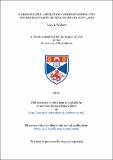Files in this item
A resourceful aspiration : understanding the governmentality of Zero Waste in Scotland
Item metadata
| dc.contributor.advisor | Bebbington, Jan | |
| dc.contributor.advisor | Mansell, Samuel Francis | |
| dc.contributor.author | Wishart, Lucy J. | |
| dc.coverage.spatial | 284 p. | en_US |
| dc.date.accessioned | 2017-10-30T14:12:05Z | |
| dc.date.available | 2017-10-30T14:12:05Z | |
| dc.date.issued | 2015-06 | |
| dc.identifier.uri | https://hdl.handle.net/10023/11946 | |
| dc.description.abstract | This thesis is about Zero Waste governance in Scotland. The thesis has three aims: empirically, it seeks to develop an understanding of the Scottish Zero Waste policy; theoretically, it aims to critically assess this policy in relation to Governmentality for Sustainable Development; and methodologically, it investigates the use of governmentality as an analytical framework through which to understand governance of complex sustainability issues. The thesis argues that existing studies of Zero Waste have limited engagement with social theories. It is suggested that governmentality offers a potential theoretical framing through which to better understand Zero Waste governance. The thesis develops a process to critically evaluate Zero Waste governmentalities in comparison with a prescriptive Governmentality for Sustainable Development. Using a Sustainability Science approach, the thesis adopts a pluralist methodology in which multiple perspectives are valued in both data collection and analysis. Using a framework developed from empirical data and academic studies, data from expert interviews and policy documents is used to construct an understanding of Zero Waste policy in Scotland. The thesis found that Zero Waste in Scottish policy is understood as a tangible goal and a philosophy of resource use. Innovative governance techniques to promote Zero Waste are identified within policy. It is argued that the Zero Waste policy in Scotland presents a new form of governmentality. It is suggested that this governmentality has the potential to align with Governmentality for Sustainable Development. However, it is found that the strong transdisciplinarity envisaged as part of Governmentality for Sustainable Development is lacking in Zero Waste governance. This thesis considers the role of post-normal techniques in Zero Waste and evaluates and promotes the use of governmentality as a way to develop the strong transdisciplinarity missing from the Zero Waste policy in Scotland. | en_US |
| dc.language.iso | en | en_US |
| dc.publisher | University of St Andrews | |
| dc.subject.lcc | TD793.9W5 | |
| dc.subject.lcsh | Waste minimization--Scotland | en |
| dc.subject.lcsh | Sustainability--Scotland | en |
| dc.title | A resourceful aspiration : understanding the governmentality of Zero Waste in Scotland | en_US |
| dc.type | Thesis | en_US |
| dc.contributor.sponsor | C. K. Marr Educational Trust | en_US |
| dc.contributor.sponsor | University of St Andrews. School of Management | en_US |
| dc.type.qualificationlevel | Doctoral | en_US |
| dc.type.qualificationname | PhD Doctor of Philosophy | en_US |
| dc.publisher.institution | The University of St Andrews | en_US |
This item appears in the following Collection(s)
Items in the St Andrews Research Repository are protected by copyright, with all rights reserved, unless otherwise indicated.

